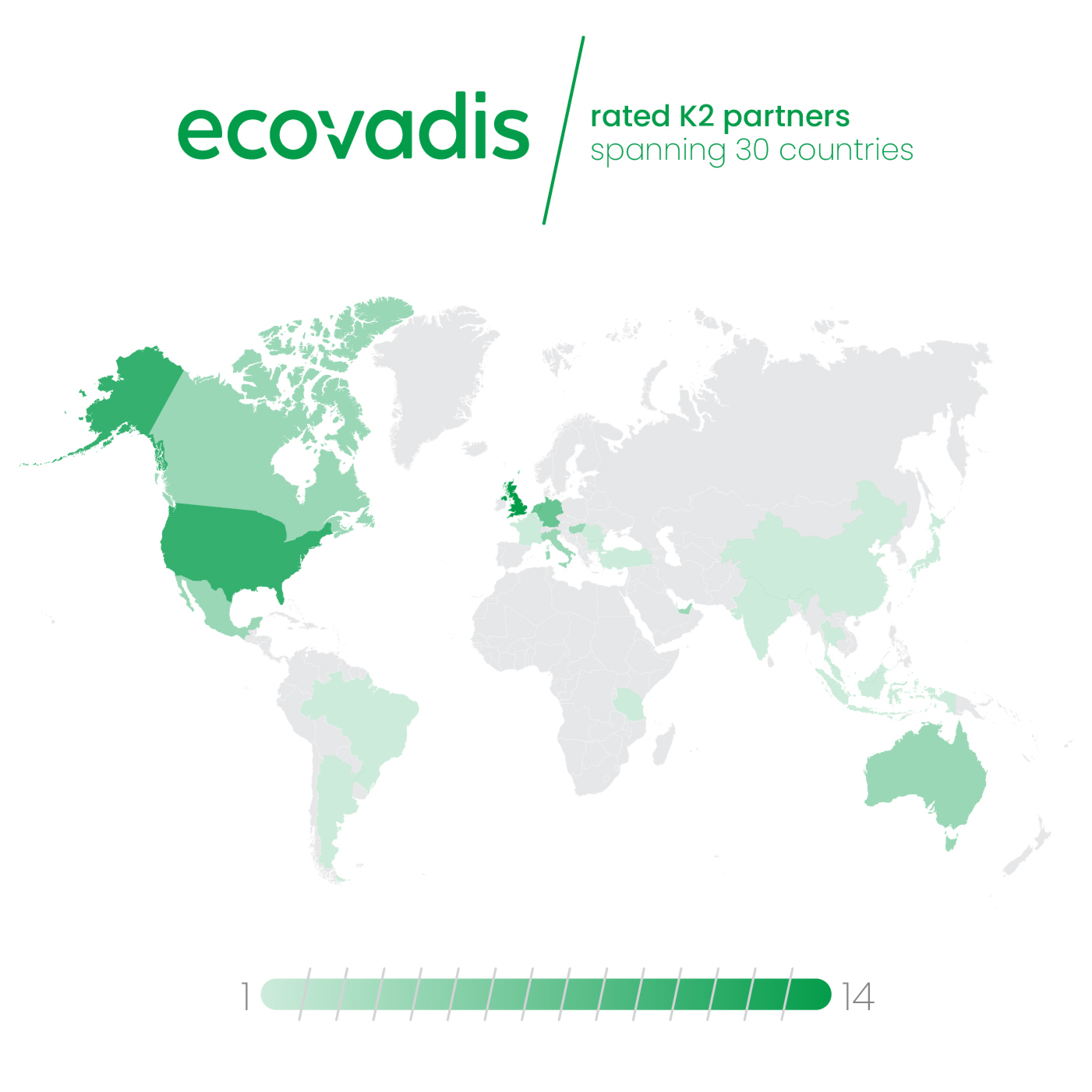
Ahead of the imminent launch of our 2023 Sustainability Report comes the third and final article in our EcoVadis series (the first article sets out how K2 turned an EcoVadis silver medal into a gold medal, and the second article explores the progress that our partners have made with EcoVadis over the past year.)
In this final article, we analyse the geographical spread of our 65 rated partners, plus consider the various factors which help and hinder progress within the field of sustainability.
As of the end of 2023, K2’s partner network includes 65 EcoVadis-rated partners spanning 30 countries. The UK tops the list of the number of partners rated by country, with 14 partners gaining either a medal or a standard rating. The USA comes in second with 8 partners rated, followed by Germany, the Netherlands and Singapore, each of which have 3 partners rated.
When it comes to the level of ratings achieved, Italy comes out on top with one partner, Bliss Moving and Logistics, achieving a platinum medal – this puts them within the top 1% of the 125,000+ companies which are currently rated by EcoVadis. Australia, Brazil, the UK and the USA come in second, with one partner from each country holding a gold medal. A silver medal is held by partners in Australia, Belgium, Hungary, the Netherlands, Romania, Singapore, Spain, the UAE, the UK and the USA. The UK tops the silver medal list, with 7 partners holding a medal of this colour.
From a regional perspective, ratings are concentrated in the USA and Western Europe. Focus on the level of rating, however, and the distribution becomes more widespread, with gold and silver medal partners spanning APAC, South America, North America and Europe.

Understanding what helps and what hinders positive change within the sustainability sphere provides context to the ratings distribution set out above. A gradual and global increase of awareness when it comes to ESG has led to an increased willingness to act upon it. Today, with organisations around the world striving to educate people on the importance of ESG plus setting recognised standards for others to follow, ESG has become a key topic at political and industry conferences, has been built into companies’ business strategies at backbone level (Sustainability is one of the six foundational pillars of Kinetic, K2’s five-year strategic business plan), and has become a determining factor in investment decisions.
According to data published by Bloomberg in 2021, the total global investment in ESG funds may hit $53 trillion by 2025. According to Deloitte’s 2023 Gen Z and Millennial Survey, c. 55% of respondents stated that they look into a company’s environmental impact and ESG policies before accepting a job with them. Furthermore, over 40% of respondents claimed that they have left/are planning to leave a company because they aren’t satisfied with the ESG efforts that the company is making. Given that over 50% of the global workforce is now made up of either Millennials or Gen Z, it is abundantly clear that ESG is here to stay.

Currently, ESG Reporting is more prevalent in the West than the East, a result of the ESG Reporting Movement beginning in the West, growing out of an interest in/concern about sustainability in general which had been developing over decades: this explains the concentration of K2 partner EcoVadis ratings in this area. However, as the world becomes increasingly international and ESG becomes an increasingly political concern, we expect to see the spread of ratings across the globe even out.
Unfortunately, there are several key obstacles which are currently disrupting ESG’s progress. Gaining access to sustainable materials is much easier in some regions than it is in others. And even if access is easy, sustainable alternatives are almost always more expensive than traditional options – especially in the short-term – which means that for many smaller companies, or companies operating out of less economically developed countries, sustainable choices are simply not financially viable.

Furthermore, for countries that are rich in natural resources, the drive to extract and commodify these tends to reign supreme, limiting the amount of traction that ESG initiatives are able to gain. Realistically, for ESG to become a driving force in countries like these, there needs to be a systemic shift in national mindset (a concept that K2 is currently exploring through its partnership with the University of Bath), which is unlikely to happen until the financial burden of sustainable choices is significantly reduced.
Whilst the challenges are multiple, over the past twenty years, huge leaps forward have been taken within the field of ESG Reporting. It is no longer a niche concept but a mainstream practice which has become a fundamental part of corporate strategy for companies. ESG Reporting is here to stay and it is the responsibility of each and every corporate not just to embrace it, but to champion it.

At K2, we strive to champion ESG Reporting, not only by working to ensure that our company remains a Great Place To Work®, but also by committing to operating as a responsible global citizen, reducing the environmental impact of both K2 and its supply chain. By doing this, we remain true to our core values, plus give our clients the confidence that they are working with an organisation which is committed to strong governance and to reducing the impact of its business activities.


